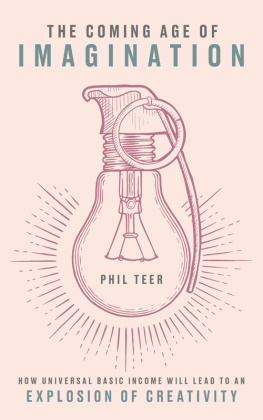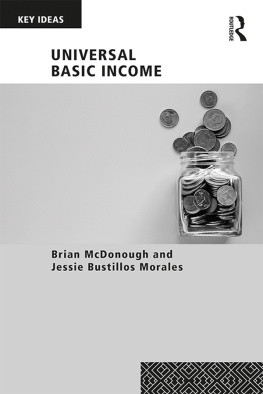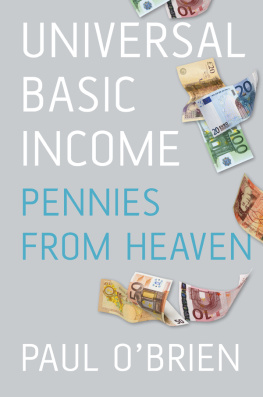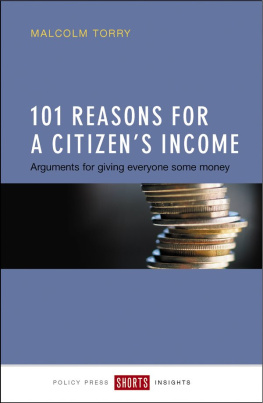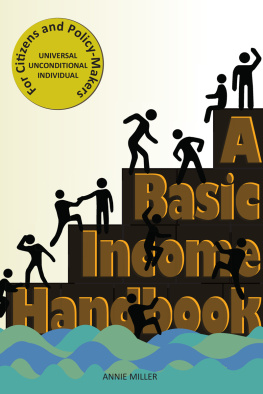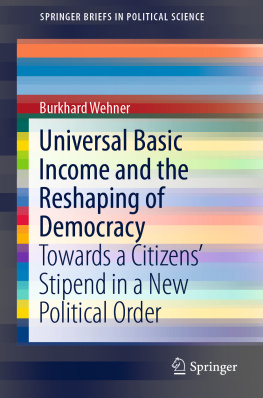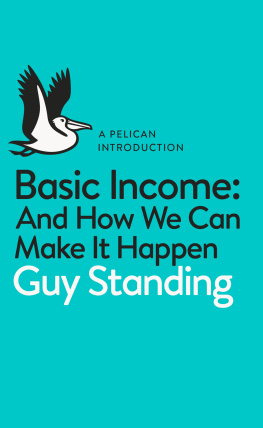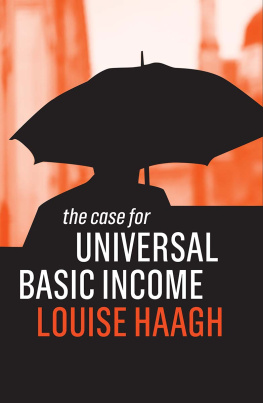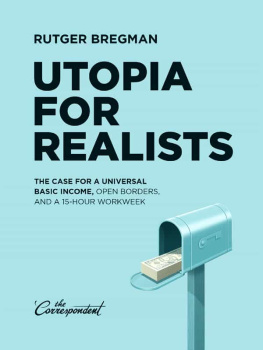
For Monique
And in memory of my mother, Pearl
Things come alive and are touched with soul when they come under the influence of imagination.
Anthony Stevens
Contents
Campaign
Lets begin at the end. Imagine a time when machines generate incredible wealth to be shared among everyone. We will still work, but we will do so because we want to, not because we need to. We will do things that stimulate and challenge us. We will do things we enjoy and we will do many different things. We will do less of the things we do now to console ourselves after too many hours doing work that we hate. Less of the bingeing and wastefulness, the self-destruction and the planet destruction, and more of the things that we find fulfilling, that we are good at and that nurture our talents. We will give more time to others, our kids, our communities and to ourselves. When we have time to give, our imagination comes into play.
We are the most creative creatures on this planet. Each and every one of us has an amazing capacity for invention and problem-solving. We can hold different ideas in our mind, clash them together and come up with something new. Each of us has a talent for something. Some can deftly turn a piece of wood on a lathe, others can whisk egg whites until the peaks are just stiff enough to make perfect meringues or charm beautiful images out of computer code. Under the magic spell of our imagination things come alive.
The end does not need to be that far away. The technology that has been promised for so long is here. We may never get those jetpacks but we have robots, we have creative machines and we are on the verge of the biggest revolution in employment since the Industrial Revolution.
There is a but. We are on the verge but we are wary of the next step. We fear that automation will push us into an abyss of high unemployment, mass poverty and civil unrest. We do not have a system in place that can cope with such change. In the old system, the need to work keeps people busy and, however unevenly, distributes wealth. We tell ourselves that this has happened before. Every time there is a huge technological leap forward people worry about losing their jobs and every time this happens new jobs are created. This may happen again but first there will be turmoil. The transition from farm to factory turned the world upside down, created dreadful working and living conditions in slums and satanic mills and spawned a creative backlash in the Romantic movement.
It might be the same this time but we can try to avoid that. We can learn from the past and commit to not letting it happen again. We have the opportunity now to see whats ahead and come up with some answers.
Universal basic income is one answer. The idea of paying every adult a sum of money, just enough to live on, not subject to means-testing, for the rest of their life as a right is becoming an increasingly popular idea.
Paying people enough money to get by will help us get through the initial turmoil in the jobs market. It will protect people as they deal with periods between jobs or adapt to the gig economy. Setting the amount of basic income at a level that is just enough to survive but no more will mean there is still an incentive to take up what work is available, to do small paid tasks or hold down a few part-time or temporary roles. Eventually, as the wealth generated by automation increases, we will be able to pay each other more. By that point we will look at work as something we do for pleasure, not because we need to eat.
The type of work we will be doing by that point will be different. Automation will take the most formulaic jobs first. There will be fewer drivers and divorce lawyers as these tasks are mostly predictable and routine, although humans will still do the trickier driving and contested divorces. The jobs that are left will be more creative or caring roles. They will be jobs with unpredictable outcomes or ones where huge amounts of empathy are required. They will be the challenging, human, rewarding and even fun jobs.
With time on our hands and a degree of financial security something amazing will happen. We will stop using our leisure time to recover from work and start using it to develop a new type of work where we do the things that we have a talent for. We will have more ideas and we will make more of our ideas happen. We will do more creative things and our creativity will be generative. It will generate new breakthroughs in science, new directions in art, new political movements and new sources of economic growth. It is not the money of investors that creates new markets. It is the creativity of the inventor, the imagination of the designer and the vision of the founder. Imagination is the most powerful force on the planet. Ideas create markets. It is our creative imagination that drives politics, society and business forward.
It is practical, this idea of basic income. It has been tested in small ways in many places. These tests always show that when you give people money they do constructive things with it. Rather than blowing it on booze, they invest it in themselves.
Some will argue that basic income is not some panacea but they are wrong. When you have no money, being given money solves your most critical problems. Money is always the answer when you are skint, hungry and in debt.
It is also utopian, this idea of basic income. It has been proposed many times in the past yet has never been fully implemented anywhere. Even when tests are going well, politics intervene. On at least one occasion, in Dauphin, Canada, the results were hidden away in a warehouse unanalysed. On another occasion, the Speenhamland system in eighteenth-century England, fake news was spread saying it led to outbreaks of mass idleness when it did no such thing.
Basic income is an idea that often falls at the hurdle of common sense. It is dismissed out of hand and without too much thought. To get over that hurdle we are going to need to encourage some uncommon sense.
Basic income wont happen by itself. The elites who own the machines wont readily accept that they have an obligation to pay people not to work. The right will worry about the morality of paying people not to work and the centre will hate the extremism of the idea. The left will worry that it is a Trojan Horse aimed at undermining the welfare state. But basic income is a new idea and politics could do with some new ideas right now. It is heartening that it is party policy for the Green Party in the UK and that Labour are coming round to the idea.
Early in 2017 I had coffee with Pat Kane and Indra Adnan. I had known Pat for years, since he had interviewed me for his book, The Play Ethic . Pat and Indra were launching The Alternative. They described it as a political platform, not a party. It would develop new political ideas. Pat and Indra were inspired by Alternativet, a Danish centre-left political party which had launched a couple of years earlier. Alternativet had toured the towns and cities of Denmark, running workshops or political laboratories where citizens, artists and politicians came together to crowdsource a manifesto. They did exceptionally well in the 2015 elections, winning 4.8 per cent of the vote, electing nine deputies and becoming the sixth biggest party. One of Alternativets policies was universal basic income.
Pat and Indra asked me to come to the launch event and talk about how I would sell the idea of basic income. The launch event, or friendly as it was called, was electrifying. A couple of hundred people were crammed into a social entrepreneurs workspace in Londons Kings Cross. Actors, musicians and poets performed and political entrepreneurs explained their ideas and projects. At times the creative tension was palpable. At one point a fight seemed to break out: two young black blokes were arguing. After a few uncomfortable moments it became clear they were actors. Their argument about territorial space at a bus stop ended in violence. Knife crime is a burning issue in London.
Next page
